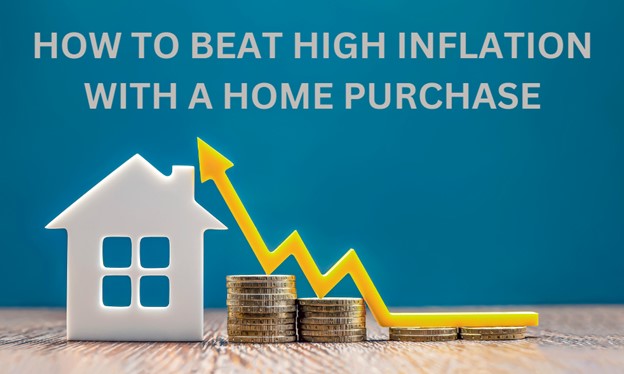 Inflation can erode the value of your savings over time, and one way to hedge against inflation is by investing in assets that appreciate in value over time. Real estate is often considered a good hedge against inflation, as property values tend to rise in line with inflation.
Inflation can erode the value of your savings over time, and one way to hedge against inflation is by investing in assets that appreciate in value over time. Real estate is often considered a good hedge against inflation, as property values tend to rise in line with inflation.
Here are some ways a home purchase can help beat high inflation:
Lock in a low-interest rate mortgage: High inflation often leads to higher interest rates, but if you lock in a low-interest rate mortgage when inflation is low, you can benefit from lower mortgage payments even if interest rates rise in the future. This can free up more money for other expenses and investments.
Appreciation: Real estate values tend to rise over time, especially in areas with high demand and limited supply. If you purchase a home in an area that is likely to appreciate, you can benefit from the increase in value over time.
Rental income: If you purchase a home as an investment property, you can generate rental income that increases with inflation. Rental income can provide a steady stream of passive income that can keep up with inflation.
Tax benefits: Homeowners can deduct mortgage interest and property taxes from their federal income taxes, which can help offset the costs of homeownership. These deductions can be especially valuable during times of high inflation when other deductions may lose value.
Diversification: Investing in real estate can diversify your investment portfolio, reducing the overall risk of inflation. Real estate has historically performed well during periods of inflation and can provide a valuable hedge against the erosion of purchasing power caused by inflation.
It’s important to note that buying a home should be a long-term investment strategy, and not a short-term solution to beat inflation. Real estate values can fluctuate over short periods of time, and it may take several years to recoup your investment. It’s also important to consider the costs of homeownership, such as maintenance, repairs, and property taxes, when evaluating the potential benefits of purchasing a home.
 Home price growth slowed in December according to the S&P Case-Shiller 20-City Home Price Index. Year-over-year home prices rose by 4.6 percent in December as compared to November’s reading of 6.8 percent growth. Rising mortgage rates caused home prices to dip as potential buyers delayed home purchases and demand for homes fell.
Home price growth slowed in December according to the S&P Case-Shiller 20-City Home Price Index. Year-over-year home prices rose by 4.6 percent in December as compared to November’s reading of 6.8 percent growth. Rising mortgage rates caused home prices to dip as potential buyers delayed home purchases and demand for homes fell. Your house is an investment, and it is important for you to treat it as such. Therefore, when is the best time to sell your house? You need to figure out how you can get the most money for your home while also lining up the sale of your house with the timeline of your life. What do you need to know?
Your house is an investment, and it is important for you to treat it as such. Therefore, when is the best time to sell your house? You need to figure out how you can get the most money for your home while also lining up the sale of your house with the timeline of your life. What do you need to know? Last week’s scheduled economic reports included readings on construction spending, the Federal Reserve’s Federal Open Market Committee statement, and the Fed Chair’s press conference. Readings on public and private-sector jobs growth and the national unemployment rate were released along with weekly readings on mortgage rates and jobless claims.
Last week’s scheduled economic reports included readings on construction spending, the Federal Reserve’s Federal Open Market Committee statement, and the Fed Chair’s press conference. Readings on public and private-sector jobs growth and the national unemployment rate were released along with weekly readings on mortgage rates and jobless claims. S & P Case-Shiller Home Price Indices reported the fastest pace of U.S home price growth in seven years. National home prices grew by 10.40 percent year-over-year in December as compared to November’s reading of 9.50 percent home price growth on a year-over-year basis.
S & P Case-Shiller Home Price Indices reported the fastest pace of U.S home price growth in seven years. National home prices grew by 10.40 percent year-over-year in December as compared to November’s reading of 9.50 percent home price growth on a year-over-year basis.